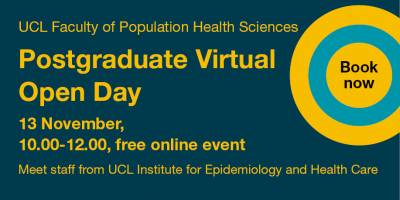My PhD Title: The psychosexual impact of testing positive for high-risk cervical human papillomavirus (HPV).
Supervisors: Dr Laura Marlow, Dr Jo Waller, Dr Julia Bailey
Lay summary: The association between high-risk HPV (hrHPV) and cervical cancer is now well established with hrHPV found to be present in virtually all cervical cancers. HPV is a very commonly occurring sexually transmitted infection and it is estimated that 80% of women will acquire HPV by age 50. While infection with hrHPV is the underlying cause of almost all cervical cancers, being infected with hrHPV does not always cause cancer and most infections resolve spontaneously. The NHS Cervical Screening Programme in England currently uses cytology to detect cervical abnormalities but will implement primary HPV testing from 2019, which will change the screening results women receive. Research has shown that women who test positive for HPV are more anxious and distressed than women who are HPV negative. The psychological consequences of testing positive for HPV may arise from its sexually transmitted nature and there may also be psychosexual consequences of testing positive. My PhD aims to explore and understand the feelings, worries and concerns that relate to, or impact on, sexual behaviour or sexual relationships among women who test positive for HPV.
My Background
I first gained an interest in Health Psychology during my undergraduate degree at Loughborough University when I explored the association between sleep duration, physical activity and mortality for my final year project. After my undergraduate degree I completed an MSc in Health Psychology at UCL during which I explored views of different types of bowel screening information using qualitative methodology. Following my Master's degree I worked as a Research Assistant at UCL's Department of Primary Care and Population Health (PCPH) on the Start2quit trial which aimed to increase the number of people attending the NHS Stop Smoking Services, and at the Division of Psychiatry on the CanTalk trial which investigated the effectiveness of Cognitive Behavioural Therapy in treating low mood in people with advanced or incurable cancer. I left UCL briefly in April 2016 to work as a Behaviour Change Advisor at Bupa before returning a few months later to begin my PhD.
I am a student on the 1+3 MRC Doctoral Training Programme (DTP) on the People, Populations and Data across the Life Course theme. I undertook three rotations in the first year of my PhD in epidemiology, sexual and reproductive health and cervical screening before choosing my PhD project.
Qualifications
2009 - BSc Psychology (Hons) - Loughborough University
2011 - MSc Health Psychology - UCL
Publications
Bennett K, Gilbert H & Sutton S (2015). Computer-tailored smoking cessation advice matched to reading ability: Perceptions of participants from the ESCAPE trial. Patient Education and Counseling, 98, 1577-1584.
Bennett KF, von Wagner C & Robb K (2015). Supplementing factual information with patient narratives in the cancer screening context: A qualitative study of acceptability and preferences. Health Expectations, 18, 2032-41.
Hassan S, Bennett K & Serfaty M (2018). Delivering Cognitive Behavioural Therapy to advanced cancer patients: A qualitative exploration into therapists' experiences within a UK psychological service. Clinical Psychology and Psychotherapy.
Bennett KF, Waller J, Chorley AJ, Ferrer RA, Haddrell JB & Marlow LAV (2018). Barriers to cervical screening and interest in self-sampling among women who actively decline screening. Journal of Medical Screening.
Appointments
Nov 2011-Oct 2013 - Research Assistant - Department of Primary Care and Population Health, UCL.
Oct 2013-April 2016 - Research Assistant - Division of Psychiatry, UCL
May 2016-Sept 2016 - Behaviour Change Advisor - Bupa
Contact details Email: kirsty.bennett.10@ucl.ac.uk
Twitter: @kirsty_bennett_
 Close
Close



